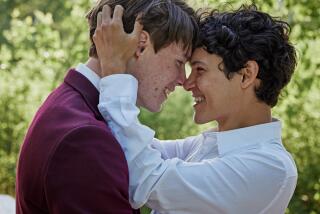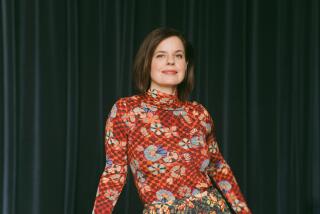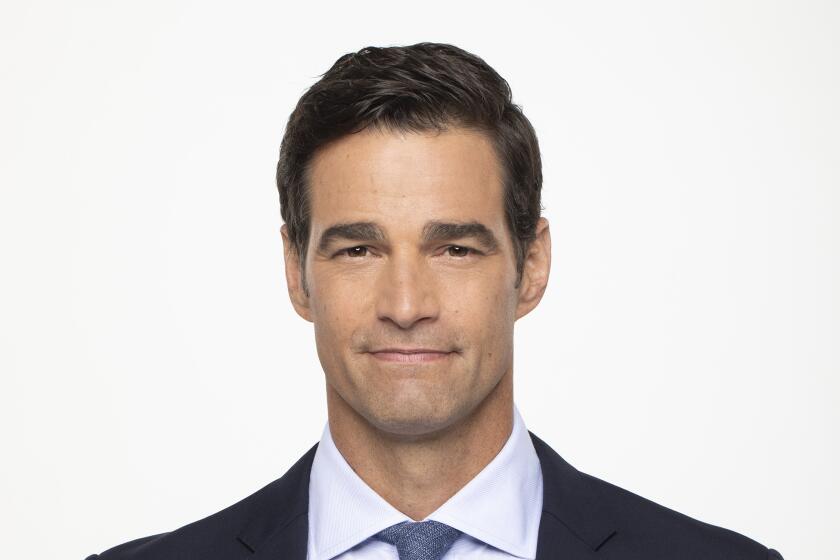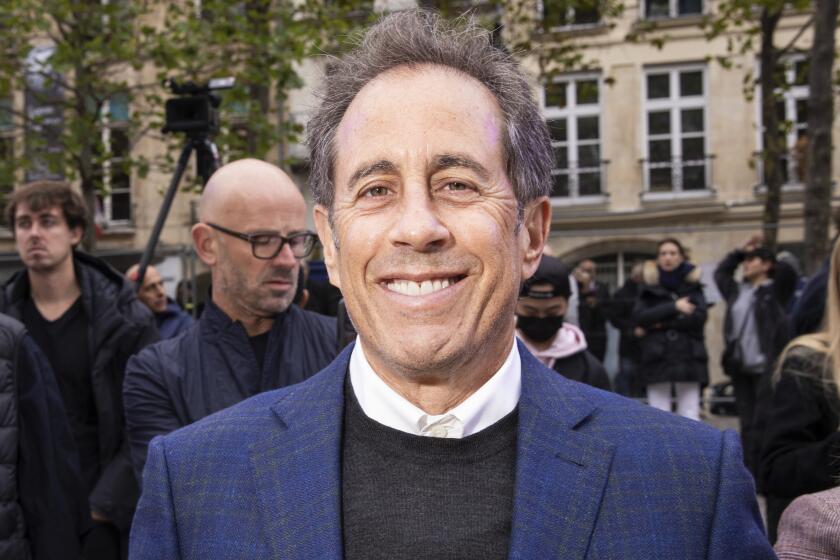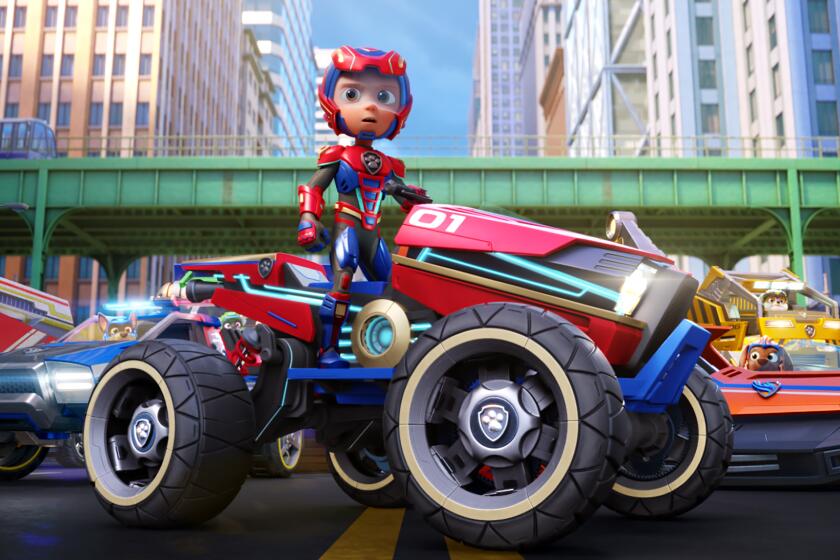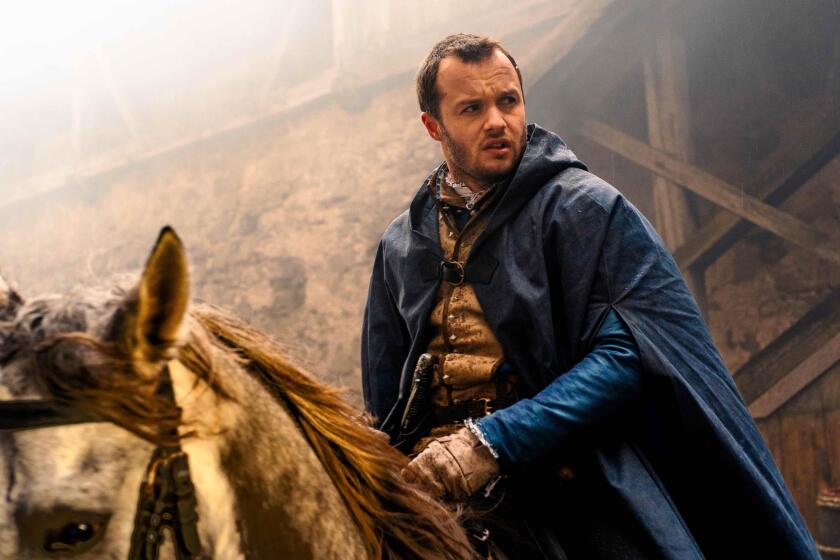Once ‘so secret,’ a queer Netflix series finally puts all its cards on the table
This story contains spoilers from the fifth and final season of “She-Ra and the Princesses of Power.”
“She-Ra and the Princesses of Power” has always been about Adora and Catra, childhood friends whose choices have landed them firmly on opposite sides of a war for the fate of their planet.
At the start of the fifth and final season of the DreamWorks/Netflix animated series, which premiered Friday, the two cannot be further apart. Adora has destroyed the sword that enables her to transform into a magical warrior after learning the truth about what she believed was her heroic destiny. Still on Etheria, she is trying to figure out who she is now that she can’t become She-Ra, while still fighting for the greater good.
Catra, on the other hand, is focused on getting into the good graces of the show’s newest, biggest bad, Horde Prime. She’s also out in space.
But over the course of the 13-episode season, Adora and Catra find their way back together. They eventually are able to admit their feelings to themselves — and each other. Then they save the world.
“Their arc is the arc of the show. It always has been,” showrunner Noelle Stevenson told The Times in a recent phone call. “Every season is about this relationship, even when they’re the farthest apart.”
Nonbinary shapeshifter Double Trouble fits perfectly into the inclusive world of Netflix’s “She-Ra and the Princesses of Power.”
Adora’s decision to defect from the Evil Horde and join the Princess Alliance at the start of the series was what caused the initial rift.
“It wasn’t just that Adora left. That was actually never really the issue at all,” explained Stevenson. “It’s that for Catra, Adora was her number one priority. Their relationship was her number one priority. And for Adora, it wasn’t.”
This backstory has made Catra one of the show’s most relatable characters, even though she’s a villain who keeps making bad decisions.
Catra’s journey has involved realizing that “you are not always going to be the number one priority in the lives of the people that you love,” Stevenson said.
She’s also had to learn “that it is OK to ask for the things that you want, because people don’t always know. Her big, heroic moment in the final season is actually just being able to ask Adora to stay.”
Adora’s journey has been about learning that being a hero is more complicated than the willingness to sacrifice yourself for the cause or for your friends.
“Putting the greater good at the top of your list is a good thing to do, but you still do have that responsibility to the individuals in your life who depend on you,” Stevenson said. “Your friends don’t want you to die and sacrifice yourself because they love you. They want you in their lives.”
During this final season, “They become good influences on each other,” Stevenson added. “Adora learns to be a little more selfish, while Catra learns to be good and to be selfless in the way that Adora is.”
Stevenson discussed the couple’s happy ending, queer visibility and the the complexities of being a hero. This conversation has been condensed and edited for clarity.
Cartoons are always great, but here are 10 animated shows to check out while quarantining.
What was it like to actually cement Adora and Catra’s relationship this season?
My mind is blown by the journey that we’ve been on. I remember early on it had to be so secret. I kept it so close to my chest because I was so terrified of being told that we were never going to be allowed to do it.
To have that first season come out and have everybody immediately pick up on [their dynamic] and know right away something that I thought I was being very sneaky about — suddenly, it just opened up a version of the story that I hadn’t thought I was allowed to tell.
It did take me a while before I finally put my cards on the table. I said, “Look, this is what I’ve been building to this whole time. And I want this to be the canonical textual arc of the final season.” And it was not only supported, but embraced.
It feels so incredible to finally just be able to talk about it and show it and have it be undeniably central to this final season in a very, very textually romantic way.
Even though the show has been very clearly inclusive, the ambiguity of Adora and Catra’s will-they/won’t-they relationship was tinged with worry about whether it actually could happen.
This is not going to be the norm forever, but right now there are two facets to representation. One of them is visibility and having it be incidental to the story. Like having Bow’s dads not be a big deal. That’s a very, very important version of representation. Seeing those characters exist and lead normal lives and be a normal part of this world.
But the other one is a little harder to do. That central and somewhat ambiguous, slow unfolding of a relationship can be difficult for a lot of reasons. Like, if their relationship becomes rocky, is that us casting queer relationships in a bad light?
One of the reasons that I have been so quiet and so coy about it in so many ways is that if I do talk freely about the fact that the relationship is romantic, I feel like it spoils it a little bit. Which is a weird thing to say because two characters being queer shouldn’t be a spoiler. That should be something that is normal and accepted.
But those are the pieces that we have to work with right now. You want to build that anticipation. You want to build to the point that it becomes inevitable. But that does also mean that it doesn’t get to be quite as visible as some of the other relationships that are a little bit more incidental.
It does seem like this is one of the only ways you can do it. It would feel very different if the relationship was ambiguous and they didn’t end up together.
Even without any kind of executive mandates, or any worry at all of censorship, I think for creators telling queer stories it’s not quite time yet for certain things.
For example, having one or both of them actually die. I wanted to always make it feel like that was possible because I feel it would not be quite as suspenseful if you felt like they were immortal. But I really do feel right now, writing queer characters, they have to be immortal right now.
I can’t see another gay character die on TV for the moment. Maybe one day we can have a tragic gay romance again, but that has been, like, the only norm for so long. So for a little while, you do have to kind of accept more of a limited set of tools.
We have to be very, very decisive and very thoughtful about how we handle it. But I hope that the more people explore these themes, the broader and broader that that toolbox becomes until we really can explore it in every possible direction. Every possible shade of black and white and gray.
Let’s talk about Catra’s haircut.
That’s like the biggest secret of all, isn’t it? It was hard to sell, in some ways. But I wrote it in the script. My excuse was she’s got a chip in her neck and we won’t be able to see it unless her hair is short. That was my excuse, but I really just thought she’d be really cute with short hair.What about Adora’s journey?
Adora goes through her redemption arc so early in the show — in the very first episode. The rest of the show becomes a deconstruction of that. And the limitations of the Chosen One narrative and her struggles to find who she really is when it’s always been about the destiny that others have placed on her.
A lesson that she has had to learn over and over again is that it’s not about the grand sacrifice. Something more is needed from you. She’s not terribly in touch with her own feelings and her own wants and desires. All she knows is that she’s got to be the hero that everyone needs.
[The] more difficult and complicated story to tell and question to ask … is: What is your responsibility to your individual relationships in your life?
In so many ways being good to your friends, your community, your partner … is about being present and being good in direct and personal ways. It’s the lesson that I think she has to learn because it does hurt her friends. It does lead to chaos and destruction at times, because she’s not willing to ask herself those questions and she’s not able to be the person in her friends’ lives that they need her to be.
I do think that [Adora’s] impulse to try and save everybody is a very, very good thing. The fact that she can’t leave a single person behind is deeply good and deeply heroic and deeply noble. And that comes from the purest part of her.
But it’s not just the action of saving somebody, it’s choosing to stay in their lives, and it’s choosing to be the person for them that they need you to be. And it’s not a story that I’ve actually seen explored very often.
Are there any character that you were excited to have interact this season?
I was especially compelled by the connection that Glimmer and Catra end up having — two characters who on the surface seem like they couldn’t be more different. They have very different ways of thinking of themselves and presenting themselves. But I think that in their heart, they’re two very similar people even though they’re also foils to each other, in a way.
In Season 4, they’re so much at each other’s throats because they see each other as the antithesis of who they are. But as soon as everything else is stripped away, both of them have failed at, on Glimmer’s side, being the ultimate hero and savior, and on Catra’s side, being the ultimate villain.
Both of them have lost everything and every person who loves them. So having them be alone with nothing and no other connections, it just brought out so much between both of them.
For Glimmer, her struggle has always been with empathy. She’s always been a little bit self-centered. She tends to focus on herself and her own goals and her own interiority, first and foremost, and is not always as sensitive to others’ needs. And that this thing that she blamed Catra for — of almost ending reality as they knew it — she came very close to doing the same thing, even though she thought that her intentions [were] good.
On Catra’s side, she has always felt that she didn’t fit in on Etheria, that Etheria had not been kind to her. So she had no love for the planet and she was pretty much seeking to destroy it as a way of enacting the bitterness that has been a part of her for so long.
But then to end up on Horde Prime’s ship and be so homesick for Etheria, Glimmer is her one connection back. And she realizes that she really is a part of Etheria, that she really does love it.
They give each other that push that they need. And they really see each other very clearly for the first time.
Shadow Weaver is a character who often makes moves that I do not see coming and that was especially true this season with her sacrifice.
Shadow Weaver is is one of the characters who has surprised me the most and rebelled against my plans for her the most. A part of why that happened was because of Lorraine Toussaint’s strength as a voice actor.
Early on in Season 1, while the plan was always for Catra to overthrow her, I really expected it to take a much longer amount of time for that to happen. But we reached the point where there was just no other way and it was the end of Shadow Weaver’s arc as this powerful, in-control, obvious villain. So immediately going into Season 2, it was like, “Well, what is her story now?”
I think what is so frustrating about her and Seasons 2 through 4 is that she absolutely believes that she is now a good guy. She absolutely believes that everything that she’s doing, while it’s still in her own selfish pursuit of power, is the right thing. And that continues into Season 5.
There’s a line in the very first episode of Season 5 where Shadow Weaver saves Micah from one of Horde Prime’s robots. Micah is just not having it and just glares at her and runs off. In the script, that was it, but then when we were recording that scene with Lorraine, she stops the session was like, “Is there room here for a ‘you’re welcome’?” So she ad-libbed that and we incorporated it.
And that was the seed for that final “you’re welcome” for her. All of the threads of Shadow Weaver’s scheming and Shadow Weaver’s twisting paths toward power, and it ends with this moment of “you’re welcome” [to Catra].
I love that it’s still smug and infuriating in its own way, but I think that it’s the first time in her life that she ever did something that was selfless in any way.
More to Read
The complete guide to home viewing
Get Screen Gab for everything about the TV shows and streaming movies everyone’s talking about.
You may occasionally receive promotional content from the Los Angeles Times.
